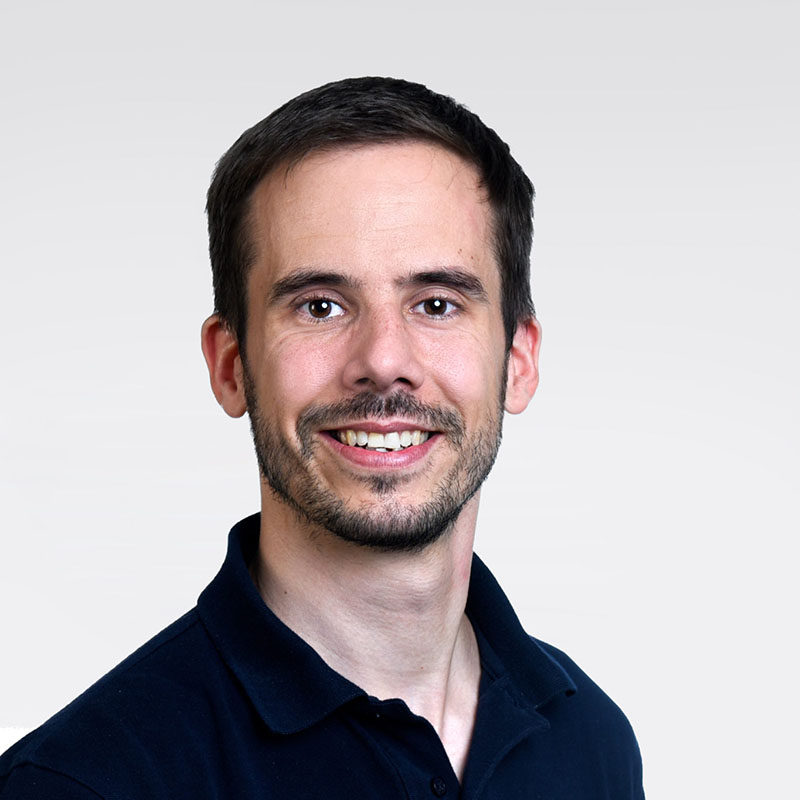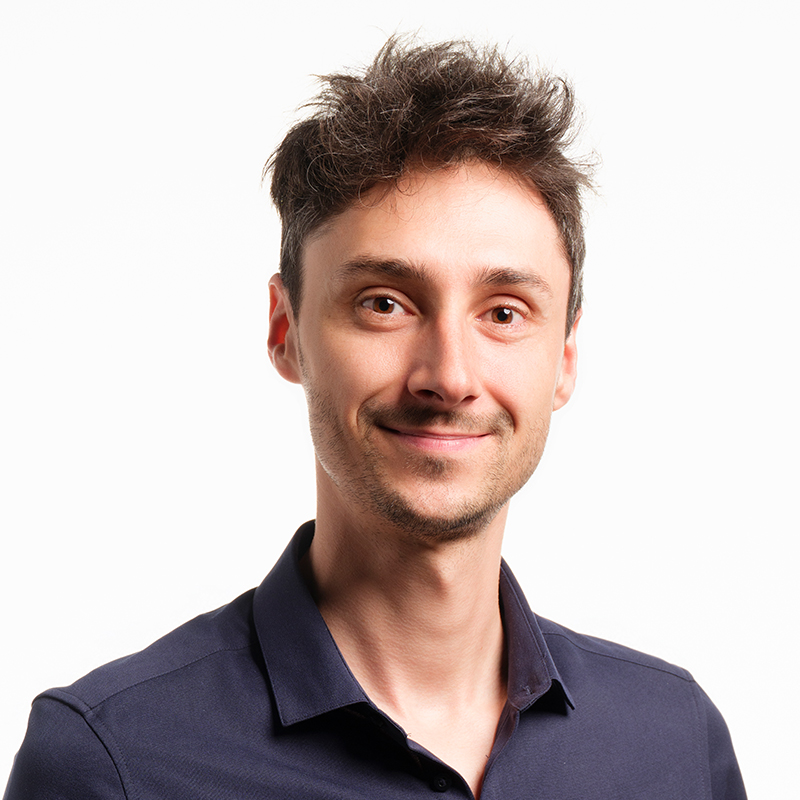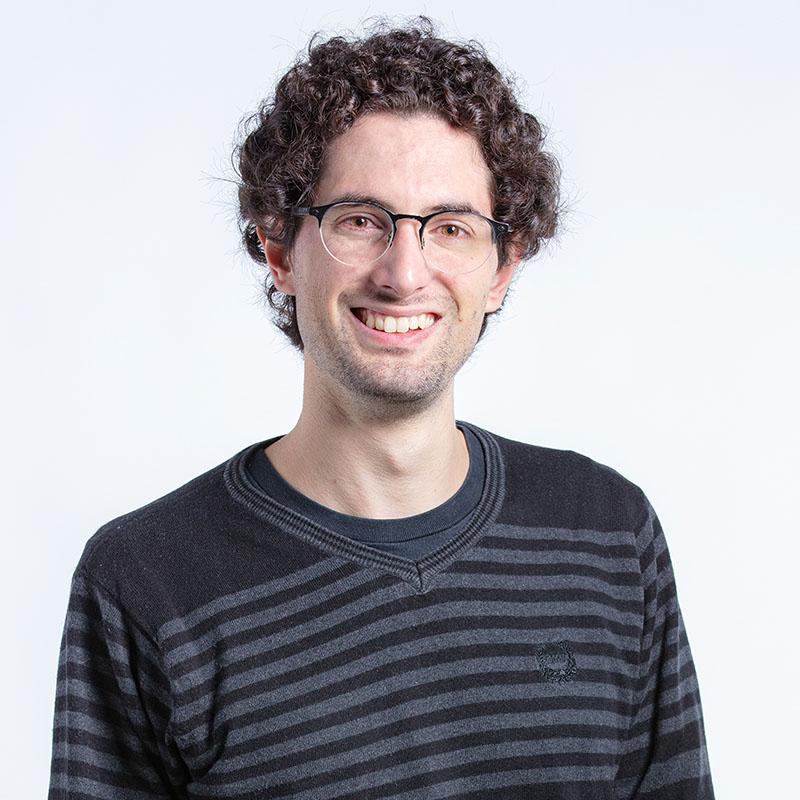
KI für Dienstleister im öffentlichen Raum


Saurabh Bhargava, joined the SDSC as a Principal Data Scientist in the Industry Cell at the Zürich office in 2022. Saurabh previously worked in the retail sector and the advertising industry in Germany. He lead and built various data products for customers using state of the art machine learning methods and industrializing them thereby adding value for the customers. He completed his PhD from ETH Zürich in June 2017 specializing in machine learning applications on Audio data. He obtained his Master’s and Bachelor’s degrees from EPFL and Indian Institute of Technology (IIT), Roorkee, India in 2011 and 2009 respectively. His interests and expertise are in combining state of the art data science and data engineering tools for building scalable data products.


Christian joined the SDSC in July 2021 as a data scientist in the industry cell. Before that he worked at the Media Technology Center at ETH Zurich to develop new ML technology for their industry partners. He completed his Master's degree in Mathematics at ETH Zurich (2017) with focus on algorithmics and machine learning. After his studies he worked as a online marketing data analyst in the news publishing business. His expertise lies in statistics, NLP and software engineering.
%20Medium.jpeg)
Presentation
KI für Dienstleister im und für den öffentlichen Raum
Diese Veranstaltung ist ausgebucht.
Diese Veranstaltung bringt Organisationen aus dem Grossraum Zürich zusammen, die Dienstleistungen im und für den öffentlichen Raum erbringen. Im Fokus stehen praxisnahe Anwendungen von Künstlicher Intelligenz (KI) und datenbasierten Ansätzen – mit realen Fallbeispielen, die zeigen, wie neue Technologien Effizienz, Entscheidungsfindung und Innovation im öffentlichen Sektor stärken können.
Was erwartet Sie?
· Ein inspirierendes Vormittagsprogramm mit Brunch im „SwissAI Tower“
· Fachvorträge erfahrener Referierender
· Greifbare Anwendungsbeispiele aus der Region
· Themenspezifische Breakout-Sessions zum Austausch
· Raum für Networking, Diskussion und neue Ideen
Zielgruppe: Entscheidungsträger:innen und Fachpersonen aus Verwaltung sowie aus Institutionen im Grossraum Zürich, die sich mit den Themen Stadtentwicklung, Mobilität, Umwelt, Gesundheit und weiteren Fragen rund um den öffentlichen Raum beschäftigen.
Sprache: Die Veranstaltung findet überwiegend auf Deutsch statt. Einzelne Programmpunkte werden auf Englisch durchgeführt.
Teilnahme: Die Teilnahme ist kostenfrei, jedoch nur mit Anmeldung möglich. Die Anzahl der Plätze ist begrenzt und wird auf Basis einer kurzen Umfrage vergeben, um das Programm optimal auf die Bedürfnisse der Teilnehmenden abzustimmen.
Anmeldeschluss: Diese Veranstaltung ist ausgebucht.
Veranstaltungspartner:
Swiss Data Science Center | Standortförderung des Kantons Zürich | ETH Industry Relations |
Zurich AI Festival

Zurich AI Festival is a flagship initiative by the ETH AI Center and Greater Zurich Area, co-created with the Amt für Wirtschaft, Kanton Zürich and Zürich Tourism, and leading partners from academia, industry, government, and the local AI ecosystem.
Details
KI für Dienstleister im öffentlichen Raum
Freitag, 03. Oktober 2025
09:00 – 13:00 Uhr mit Brunch
“Swiss AI Tower" - Andreasturm (14. Etage)
Andreasstrasse 5
8050 Zürich-Oerlikon
Programme
Programm:
09:00 Ankunft & Kennenlernen bei Kaffee, Gipfeli & Müsli
09:30 Einführung, Informations-und Datenanalyse
· Vorstellung SDSC, Standortförderung Kanton Zürich, ETH Industry Relations
· Einführung: Entmystifizierung der KI für Dienstleister im öffentlichen Raum
· Fallstudien: KI in öffentlichem Sektor, Transportwesen, Behörden
10:30 Kaffee & Brunch
11:00 Break-out Sessions | Diskussion in Arbeitsgruppen
12:00 Offene Feedbackrunde & Zusammenfassung
12:15 Brunch & Netzwerken
13:00 Veranstaltungsende
Referenten:
· Dr. Saurabh Bhargava, Principal Data Scientist, Swiss Data Science Center (SDSC)
· Markus Müller, Co-Leiter Standortförderung - Amt für Wirtschaft Kanton Zürich
· Dr. Jan-Helge Zimmermann, ETH Zurich Industry Relations
· Christian Schneebeli, Senior Datat Scientist, Swiss Data Science Center (SDSC)
· Yanick Schraner, Leiter Künstliche Intelligenz, Data Competence Center, Kanton Basel Stadt
· Prof. Dr. Christian Geiger, Assistant Professor for Digital Government, Innovation & Transformation,
Berner Fachhochschule (BFH), vorhergehende Rollen bei Stadt St. Gallen, Digitale Verwaltung
Schweiz & Smart City Hub Switzerland
· Pascal Kaufmann, Gründer und Vorstandsmitglied von Alpine AI, Gründer und Group CEO von
MindFire
Über das Swiss Data Science Center (SDSC)
Ab 2025 agiert das Swiss Data Science Center (SDSC) als nationale Forschungsinfrastruktur mit dem Auftrag, effizientes Datenmanagement, maschinelle Lernmethoden und KI in der gesamten Schweiz zu etablieren und die digitale Transformation von Schweizer Unternehmen und Organisationen zu unterstützen. Mehr Informationen: www.datascience.ch
Über die Standortförderung im Amt für Wirtschaft, Kanton Zürich
Wir fördern Innovationen und unterstützen Unternehmen – von der Gründung bis zur Vernetzung in den Zürcher Schlüsselbranchen. Mit unserer Plattform «InnovationZurich» bieten wir Orientierung sowie Informationen zum Innovationsstandort. Ansässige Unternehmen unterstützen wir mit dem Angebot von “ahead” bei ihren Innovationsvorhaben. Zudem sind wir auch Anlaufstelle für Anliegen von ansiedlungsinteressierten Unternehmen. Weitere Informationen: zh.ch/standort | innovation.zuerich | aheadzh.ch
Über ETH Industry Relations
Sucht Ihr Unternehmen Forschungspartner an der ETH Zürich? ETH Industry Relations unterstützt Sie bei der Suche nach kompetenten Partnern, organisiert Besuche und Workshops und bietet Beratung zu Finanzierungsmöglichkeiten für Forschungskollaborationen. Mehr Informationen: ETH Industry Relations
Other events

SDSC Hackathon: ORD for the Sciences


Valerio started his career working for 7 years as a particle-physics researcher at CERN. In 2016, he moved to consulting, applying data science in several industries. First, he joined the Quant team of Ernst & Young in Geneva. Later, he created his own company, SamurAI sàrl, providing consulting services for his clients. He also has a passion for teaching very complex subjects in simple terms. That is why he particularly enjoys offering training programs to private companies and universities. Valerio joined the SDSC in May 2022 as a Principal Data Scientist with the mission of accompanying industrial partners and other institutions through their data science journey.


Luis is originally from Spain, where he completed his bachelor's studies in Electrical engineering, and the Ms.C. on signal theory and communications, both at the University of Seville. During his Ph.D. he started focusing on machine learning methods, more specifically message passing techniques for channel coding, and Bayesian methods for channel equalization. He carried it out between the University of Seville and the University Carlos III in Madrid, also spending some time at the EPFL, Switzerland, and Bell Labs, USA, where he worked on advanced techniques for optical channel coding. When he completed his Ph.D. in 2013, he moved to the Luxembourg Center on Systems Biomedicine, where he switched his interest to neuroscience, neuroimaging, life sciences, etc., and the application of machine learning techniques to these fields. During his 4 and a half years there as a Postdoc, he worked on many different problems as a data scientist, encompassing topics such as microscopy image analysis, neuroimaging, single-cell gene expression analysis, etc. He joined the SDSC in April 2018. As Lead Data Scientist, Luis coordinates projects in various domains. Several projects focus on the application of natural language processing and knowledge graphs to the study of different phenomena in social and political sciences. In the domains of architecture and engineering, Luis is responsible for projects centered on the application of novel generative methods to parametric modeling. Finally, Luis also coordinates different projects in robotics, ranging from collaborative robotic construction to deformable object manipulation.


Carlos Vivar Ríos joined the SDSC in 2023, where he is part of the Open Research Data and Engagement Unit (ORDES). As a multidisciplinary data engineer, he brings a diverse background in biology, cognitive sciences, and bioinformatics from the University of Malaga. His multifaceted professional career spans several disciplines, including genomics at RIKEN in Yokohama, multidimensional image analysis in microscopy at the University of Lausanne (UNIL), and cellular biology modeling at INRIA in Lyon. Carlos has been involved in a variety of projects, such as analyzing astrocyte calcium dynamics, de novo sequencing Solea senegalensis, drug repurposing for Alzheimer's based on GWAS studies, conducting geospatial analysis for linguistic corpora, and assessing drought through remote sensing. He is dedicated to advancing reproducible research methods and actively supports the open science movement.


Oksana is a disruptive innovator bringing her positive energy to projects. Driven by her curiosity and can-do attitude she excels in industrial and academic contexts. Oksana earned her PhD in Life Sciences and Bioinformatics from the University of Lausanne after two MSc in Bioinformatics and in Information Systems from the University of Geneva. For more than 10 years, she has been committed to actively promoting the value of data science and advocating the best practices for reproducible and ethical research. She believes that Swiss Data Science Center is a key player in building a competitive data economy in Switzerland leveraging its innovative potential and renown commitment to quality.

Data-Driven Control Methods for Energy and Manufacturing


Roberto holds an M.Sc. and a Ph.D. in Particle Physics from the University of Torino, Italy. He has worked for several years in fundamental research as a senior fellow and data scientist at the CERN Experimental Physics division and on a research project supported by the Belgian National Fund for Scientific Research (FNRS). In 2018 he moved to EPFL to work on data mining and Machine Learning techniques for the built environment and renewable energies. He has started and led multiple collaborations with academic and industry partners in the energy domain. Roberto joined the SDSC in September 2021 as a Principal Data Scientist with the mission of accompanying industries, NGOs and international organizations through their data science journey.


Carl holds a Ph.D in Mathematics from École des Ponts ParisTech and Université Gustave Eiffel in Paris. He has broad interests in statistics and stochastic control, and works on reinforcement learning, generative methods and time series forecasting, with applications in various domains such as energy, finance and physics. He worked with EDF R&D and Finance des Marchés de l’Energie (FiME) laboratory on applications of machine learning to risk management, including time series generation and deep hedging. He joined the SDSC in 2022 as a senior data scientist in the academic team at École Polytechnique Fédérale de Lausanne (EPFL).


Victor joined as a Data Scientist in the SDSC Innovation team in 2023. He holds a Bachelor's degree in Mechanical Engineering (B.Eng.) from the University of Pretoria in South Africa, as well as Master's degrees in Robotics and Mechatronics (M.Sc.) and Artificial Intelligence (M.Sc.) from KU Leuven in Belgium.Prior to joining SDSC, he worked for several years as a consultant at Capgemini Engineering and as an R&D Engineer at Toyota Motor Europe. Within the Advanced Powertrain and Target Setting team at Toyota, Victor played a crucial role in the pre-development of innovative electric and fuel-cell vehicles. His responsibilities included leading the development and deployment of Natural Language Processing (NLP) tools and pipelines, data science and machine learning, building data analytics dashboards, statistical forecasting, powertrain design, optimal control system design, and strategic technical target setting. He is passionate about leveraging his combined Engineering and Data Science knowledge to solve complex problems in the industry.


After earning a MSc in Theoretical Physics at University of Padua, Giulio graduated in Quantitative Finance from Bocconi University. Before joining the SDSC industry cell in June 2021, he spent a few years working in the financial sector, where he mainly dealt with the application of machine learning to financial risk management. When not coding, Giulio spends his free time playing bass guitar, hiking and cooking.

ENID | Enabling Innovation with Data Science & AI at ETH Zurich


Prof. Olivier Verscheure is the director and founder of the Swiss Data Science Center (SDSC). Olivier also co-leads a joint training program between EPFL and HEC Lausanne, specifically designed for senior executives. Since 2018, Olivier has been a member of the Board of Directors of Lonza, a global leader in the life sciences sector. This company provides products and services to the pharmaceutical, biotechnology, and specialized healthcare industries.Olivier began his career at IBM Research after earning his Ph.D. in computer science from EPFL. He held several research and leadership positions at the IBM T. J. Watson Research Center in New York and co-created and co-directed the IBM Research center in Dublin, Ireland, before joining the EPFL in 2016.


Silvia holds an MSc in Computer Science from EPFL and a PhD in Computer Science from the University of York, UK. She has been a senior research fellow at the University of Trento and later at Politecnico di Milano, Italy. Here, she had the chance to work on Marie Curie and ERC projects relating to natural language processing. From 2012 to 2019, she was a Senior Manager and NLP expert at ELCA Informatique Switzerland, whose AI department she helped create and expand. Silvia joined the Swiss Data Science Center in 2019 and is currently its Chief Transformation Officer, in charge of the team leading organizations to digital transformation.


Anna joined SDSC as a Data Scientist focusing on industry collaborations in July 2019. She completed her PhD in Bioinformatics at the University of Luxembourg, where she analysed large-scale heterogeneous datasets and leveraged multiple disciplines: Statistics, Network Analysis, and Machine Learning. Before joining SDSC, Anna worked as a Data Scientist at Deloitte Luxembourg, with a focus on computer vision and time-series analysis.Currently, Anna is a Principal Data Scientist based at the ETH Zurich office, where she leads biomedical collaborations with industry partners. Anna works on a range of projects: protein properties prediction, biomanufacturing optimization, statistical model evaluation and others.


Matthias Galipaud obtained his PhD in evolutionary biology in 2012 from the University of Burgundy in Dijon (France), and held postdoctoral positions as a mathematical biologist at the university of Bielefeld (Germany) and the university of Zurich, where he researched the evolutionary theories of aging and mate choice. In 2020, he became a data scientist, developing machine learning solutions for startups in Switzerland and Australia before joining the SDSC Innovation Team in November 2022.


Dan received an MSc in civil and environmental engineering from UC Berkeley and a Ph.D. from EPFL, where he developed models combining machine learning and geographic information systems to estimate renewable energy potentials on a large scale. After serving as a researcher/data scientist at Unisanté (Lausanne) and completing a one-year postdoc at the Quebec Artificial Intelligence Institute (Mila) in Montréal, Dan joined the SDSC Innovation team. His work has generally been focusing on crafting and tailoring machine learning methods and deep learning architectures for a variety of domains, most notably the spatio-temporal modeling and forecasting of environmental and energy related variables, as well as multiple applications in public health research.
Contact us
Let’s talk Data Science
Do you need our services or expertise?
Contact us for your next Data Science project!



